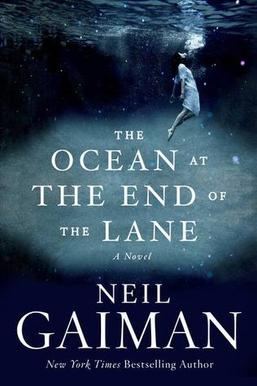Gaiman, Neil. The Ocean at the End of the Lane. [William Morrow, 2013]
The Meat
The Ocean at the End of the Lane is about a child, but I'm not sure if it's intended to be a children's book. This is probably not unexpected, since Neil Gaiman has a different idea of children's literature than most people. His Newbery Award-winning The Graveyard Book begins with a toddler's family being murdered, after all. But in the case of Gaiman's new book, it can hardly matter. I'm not sure that this is a masterpiece, but it is certainly a moving and extremely resonant book that I am certain can mean different things, all of them equally valid, to readers of different ages.
The plot concerns a middle-aged man who visits the street where he grew up, and unconsciously takes a detour to the Hempstock Farm, at the end of the lane. He asks after his forgotten childhood friend, Lettie Hempstock, and remembers that she called the duck pond on the farm "her ocean." We are given the wonderfully inviting line "I remembered that, and in remembering, I remembered everything." What he remembers is a few weeks from his seventh year, when a lodger at his family's home committed suicide, and unwittingly opened a gateway between this world and the larger reality of creation, which is populated with many more things than are dreamt of in our philosophy, Horatio. The narrator, as a boy, experiences many familiar childhood fears, from strangers, to the loss of a pet, to malicious babysitters, but is also treated (as are we) to the idea that for all the horrors we may believe in, there is an equal measure of good out there that we had not expected to find.
Gaiman is quoted as once having said that the difference between America and England is that in England, 100 miles is a long way, and in America, 100 years is a long time. This is absolutely true, but as an American, it is hard to really get my head around how old things in Europe can really be. In the story, it is mentioned that the Hempstock Farm is mentioned in The Domesday Book, which was the first landed survey of Britain after William the Conqueror arrived in 1066. That's nearly a thousand years ago. And the story deals also in things that are older yet. Against such a backdrop, a story about memory, and all we have unwittingly lost as our childhood eyes give way to world-weary middle-aged ones, takes on added poignancy.
Madeline L'Engle, of A Wrinkle in Time fame, wrote a non-fiction book about the creative process called Walking on Water. In it, she talks about early memories of being able to run across the surface of a pond as a child because, I guess like Yosemite Sam, who must learn about gravity before he can fall, she didn't know she shouldn't be able to. I've never been sure that I believed her, but I believe that she believed it. Gaiman's is a work of fiction, but in the same way, it made me wonder what magic I have forgotten, and it made me long for the ability to see it once again. Even if briefly.
The Math
Objective Quality: 9/10
Bonuses: +1 for making something very new feel very old, indeed
Penalties: -1 for coming in at a scant 192 pages, and making me wish it were far longer
Nerd Coefficient: 9/10. Very high quality, standout in its category.
Click here to read up on our scoring system, and why a "9" is serious business.
